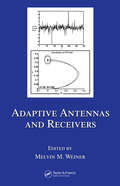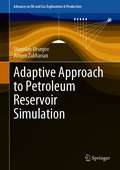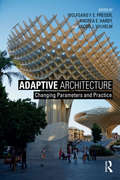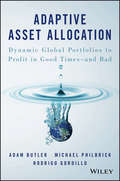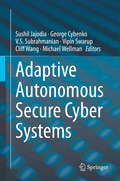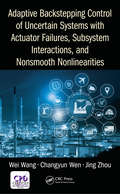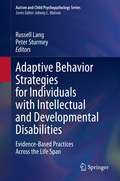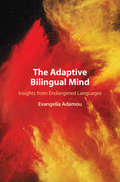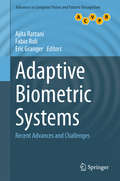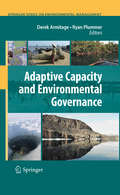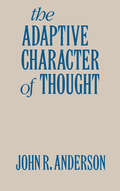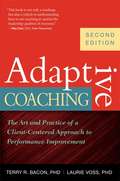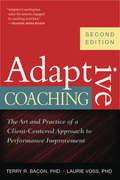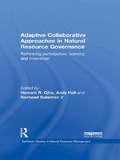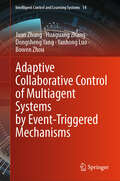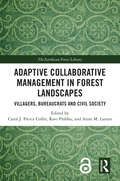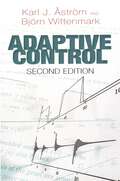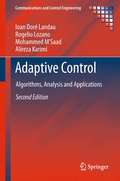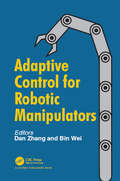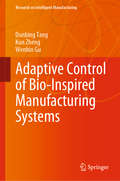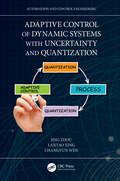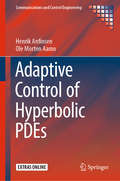- Table View
- List View
Adaptive Antennas and Receivers (Electrical and Computer Engineering)
by Melvin M. WeinerIn our modern age of remote sensing, wireless communication, and the nearly endless list of other antenna-based applications, complex problems require increasingly sophisticated solutions. Conventional antenna systems are no longer suited to high-noise or low-signal applications such as intrusion detection. Detailing highly effective approaches to non-Gaussian weak signal detection, Adaptive Antennas and Receivers provides an authoritative introduction to state-of-the-art research on the modeling, testing, and application of these technologies.Edited by innovative researcher and eminent expert Melvin M. Weiner, this book is the first to integrate three advanced approaches to non-Gaussian weak signal detection into a single reference: homogeneous partitioning of the surveillance volume, adaptive antennas, and adaptive receivers. Comprising self-contained chapters contributed by renowned experts such as Donald D. Weiner and Ronald Fante, each chapter explores the techniques, theoretical basis, and applications of the approach under discussion. The book considers signal detection in the presence of external noise such as clutter residue, interference, atmospheric noise, jammers, external thermal noise, in vivo surrounding tissue, and camouflaging material, making it ideal for use across a broad spectrum of applications.This authoritative reference supplies more than 750 figures and tables, 1460 equations, and 640 references. Adaptive Antennas and Receivers is an ideal resource for improving performance in surveillance, communication, navigation, artificial intelligence, computer tomography, neuroscience, and intrusion detection systems, to name only a few.
Adaptive Approach to Petroleum Reservoir Simulation (Advances in Oil and Gas Exploration & Production)
by Stanislav Ursegov Armen ZakharianThis book presents unique features of the adaptive modeling approach based on new machine learning algorithms for petroleum exploration, development, and production. The adaptive approach helps simulation engineers and geoscientists to create adequate geological and hydrodynamic models. This approach is proven to be a real alternative to traditional techniques, such as deterministic modeling. Currently, machine-learning algorithms grow in popularity because they provide consistency, predictiveness, and convenience. The primary purpose of this book is to describe the theoretical state of the adaptive approach and show some examples of its implementation in simulation and forecasting different reservoir processes.
Adaptive Architecture: Changing Parameters and Practice
by Wolfgang F. E. Preiser Andrea E. Hardy Jacob J. WilhelmThe constant in architecture's evolution is change. Adaptive Architecture explores structures, or environments that accommodate multiple functions at the same time, sequentially, or at periodically recurring events. It demonstrates how changing technological, economic, ecological and social conditions have altered the playing field for architecture from the design of single purpose structures to the design of interacting systems of synergistically interdependent, distributed buildings. Including contributors from the US, UK, Japan, Australia, Germany and South Africa, the essays are woven into a five-part framework which provides a broad and unique treatment of this important and timely issue.
Adaptive Asset Allocation
by Michael Philbrick Rodrigo Gordillo Adam ButlerBuild an agile, responsive portfolio with a new approach to global asset allocation Adaptive Asset Allocation is a no-nonsense how-to guide for dynamic portfolio management. Written by the team behind Gestaltu.com, this book walks you through a uniquely objective and unbiased investment philosophy and provides clear guidelines for execution. From foundational concepts and timing to forecasting and portfolio optimization, this book shares insightful perspective on portfolio adaptation that can improve any investment strategy. Accessible explanations of both classical and contemporary research support the methodologies presented, bolstered by the authors' own capstone case study showing the direct impact of this approach on the individual investor. Financial advisors are competing in an increasingly commoditized environment, with the added burden of two substantial bear markets in the last 15 years. This book presents a framework that addresses the major challenges both advisors and investors face, emphasizing the importance of an agile, globally-diversified portfolio. Drill down to the most important concepts in wealth management Optimize portfolio performance with careful timing of savings and withdrawals Forecast returns 80% more accurately than assuming long-term averages Adopt an investment framework for stability, growth, and maximum income An optimized portfolio must be structured in a way that allows quick response to changes in asset class risks and relationships, and the flexibility to continually adapt to market changes. To execute such an ambitious strategy, it is essential to have a strong grasp of foundational wealth management concepts, a reliable system of forecasting, and a clear understanding of the merits of individual investment methods. Adaptive Asset Allocation provides critical background information alongside a streamlined framework for improving portfolio performance.
Adaptive Autonomous Secure Cyber Systems
by Sushil Jajodia Cliff Wang V. S. Subrahmanian Vipin Swarup George Cybenko Michael WellmanThis book explores fundamental scientific problems essential for autonomous cyber defense. Specific areas include:Game and control theory-based moving target defenses (MTDs) and adaptive cyber defenses (ACDs) for fully autonomous cyber operations;The extent to which autonomous cyber systems can be designed and operated in a framework that is significantly different from the human-based systems we now operate;On-line learning algorithms, including deep recurrent networks and reinforcement learning, for the kinds of situation awareness and decisions that autonomous cyber systems will require;Human understanding and control of highly distributed autonomous cyber defenses;Quantitative performance metrics for the above so that autonomous cyber defensive agents can reason about the situation and appropriate responses as well as allowing humans to assess and improve the autonomous system.This book establishes scientific foundations for adaptive autonomous cyber systems and ultimately brings about a more secure and reliable Internet. The recent advances in adaptive cyber defense (ACD) have developed a range of new ACD techniques and methodologies for reasoning in an adaptive environment.Autonomy in physical and cyber systems promises to revolutionize cyber operations. The ability of autonomous systems to execute at scales, scopes, and tempos exceeding those of humans and human-controlled systems will introduce entirely new types of cyber defense strategies and tactics, especially in highly contested physical and cyber environments. The development and automation of cyber strategies that are responsive to autonomous adversaries pose basic new technical challenges for cyber-security.This book targets cyber-security professionals and researchers (industry, governments, and military). Advanced-level students in computer science and information systems will also find this book useful as a secondary textbook.
Adaptive Backstepping Control of Uncertain Systems with Actuator Failures, Subsystem Interactions, and Nonsmooth Nonlinearities
by Wei Wang Changyun Wen Jing ZhouIn practice, actuators often undergo failures and various factors influence its effectiveness. Also due to the increasing complexity of large-scale systems, subsystems are often interconnected, whereas the interactions between any two subsystems are difficult to deal with. This book details a series of new methodologies of designing and analyzing adaptive backstepping control systems involving treatment on actuator failures, subsystem interactions and nonsmooth nonlinearities. Moreover, it discusses some interesting open issues in adaptive failure accommodation, decentralized adaptive control and distributed adaptive coordinated control.
Adaptive Behavior and Learning
by Staddon J. E. R.Adaptive behaviour is of two types only. Either an animal comes equipped by heredity with the ability to identify situations in which a built-in response is appropriate or it has mechanisms allowing it to adapt its behaviour in situations in which the correct response cannot be predicted. Adaptive behaviour of the second type comes about through natural selection, which weeds out individuals that identify situations inaccurately or respond inappropriately. Adaptive behaviour of the second type comes about through the selection of behavioural variants by the environment. This book is about the second type of adaptive behaviour, of which learning is the most highly developed form. Adaptive Behaviour and Learning constitutes a provocative theoretical integration of the psychological and biological approaches to adaptive behaviour. John Staddon's ideas will have a major impact on psychologists and zoologists' conceptions of the problem of learning. Highly readable, the book will serve as a useful text for courses in learning, animal behaviour and comparative psychology.
Adaptive Behavior Strategies for Individuals with Intellectual and Developmental Disabilities: Evidence-Based Practices Across the Life Span (Autism and Child Psychopathology Series)
by Peter Sturmey Russell LangThis book examines strategies for teaching adaptive behavior across the lifespan to individuals with intellectual and developmental disabilities who regularly experience difficulty learning the skills necessary for daily living. It details evidence-based practices for functional life skills, ranging from teaching such basic hygiene as bathing, brushing teeth, and dressing to more complex skills, including driving. In addition, the volume describes interventions relating to recreation, play, and leisure as well as those paramount for maintaining independence and safety in community settings (e.g., abduction prevention skills for children). The book details existing evidence-based practices as well as how to perform the interventions.Key areas of coverage include:Basic hygiene as bathing, brushing teeth, and dressing.Advanced, complex skills, including driving, recreation, play, and leisure.Skills to maintain independence and safety in community settings, including abduction prevention skills for children.Teaching new technology skills, such as using mobile telephones and apps as well as surfing the web.Training caregivers to promote and support adaptive behavior.Use of evidence-based practices for teaching and supporting adaptive behavior for individuals with intellectual disabilities and autism.Adaptive Behavior Strategies for Individuals with Intellectual and Developmental Disabilities is an essential reference for researchers, professors, and graduate students as well as clinicians, therapists, and other scientist-practitioners in developmental psychology, behavioral therapy/rehabilitation, social work, clinical child and school psychology, child and adolescent psychiatry, pediatrics, and special education.
The Adaptive Bilingual Mind: Insights from Endangered Languages
by Evangelia AdamouAt present, much of the research on bilingual cognition focuses on late second language learners of a small number of languages. In this fascinating book, Evangelia Adamou widens the net by integrating advances in the field of bilingualism with the study of endangered languages. Drawing on recent studies from Europe and Latin America, she demonstrates that experimental psycholinguistic methods can be successfully applied outside the lab and, conversely, how data from these understudied populations provide new insights into the adaptive capacities of the bilingual mind. Adamou shows how bilinguals manage competing conceptualizations of time and space, how their grammars and language mixing patterns adapt to cognitive constraints such as the need for simplification, and how language processing concurrently adapts to their complex bilingual experience. Combining statistical analyses with detailed linguistic and ethnographic information, this essential book will appeal to scholars of bilingualism, cognitive sciences, language endangerment, and language contact.
Adaptive Biometric Systems: Recent Advances and Challenges (Advances in Computer Vision and Pattern Recognition)
by Ajita Rattani Fabio Roli Eric GrangerThis interdisciplinary volume presents a detailed overview of the latest advances and challenges remaining in the field of adaptive biometric systems. A broad range of techniques are provided from an international selection of pre-eminent authorities, collected together under a unified taxonomy and designed to be applicable to any pattern recognition system. Features: presents a thorough introduction to the concept of adaptive biometric systems; reviews systems for adaptive face recognition that perform self-updating of facial models using operational (unlabeled) data; describes a novel semi-supervised training strategy known as fusion-based co-training; examines the characterization and recognition of human gestures in videos; discusses a selection of learning techniques that can be applied to build an adaptive biometric system; investigates procedures for handling temporal variance in facial biometrics due to aging; proposes a score-level fusion scheme for an adaptive multimodal biometric system.
Adaptive Capacity and Environmental Governance (Springer Series on Environmental Management)
by Derek Armitage Ryan PlummerRapid environmental change calls for individuals and societies with an ability to transform our interactions with each other and the ecosystems upon which we depend. Adaptive capacity - the ability of a social-ecological system (or the components of that system) to be robust to disturbances and capable of responding to changes - is increasingly recognized as a critical attribute of multi-level environmental governance. This unique volume offers the first interdisciplinary and integrative perspective on an emerging area of applied scholarship, with contributions from internationally recognized researchers and practitioners. It demonstrates how adaptive capacity makes environmental governance possible in complex social-ecological systems. Cutting-edge theoretical developments are explored and empirical case studies offered from a wide range of geographic settings and natural resource contexts, such as water, climate, fisheries and forestry. * Of interest to researchers, policymakers and resource managers seeking to navigate and understand social-ecological change in diverse geographic settings and resource contexts
The Adaptive Challenge of Climate Change
by O'Brien, Karen and Selboe, Elin Karen O'Brien Elin SelboeThis book presents a new perspective on adaptation to climate change. It considers climate change as more than a problem that can be addressed solely through technical expertise. Instead, it approaches climate change as an adaptive challenge that is fundamentally linked to beliefs, values and worldviews, as well as to power, politics, identities and interests. Drawing on case studies from high-income countries, the book argues that it is time to consider adaptation to climate change as a challenge of social, personal and political transformations. The authors represent a variety of fields and perspectives, illustrating the importance of interdisciplinary approaches to the problem. The book will be of interest to researchers, policy makers and advanced students in the environmental sciences, social sciences and humanities, as well as to decision makers and practitioners interested in new ideas about adapting to climate change.
The Adaptive Character of Thought (Studies in Cognition)
by John R. AndersonThis important volume examines the phenomena of cognition from an adaptive perspective. Rather than adhering to the typical practice in cognitive psychology of trying to predict behavior from a model of cognitive mechanisms, this book develops a number of models that successfully predict behavior from the structure of the environment to which cognition is adapted. The methodology -- called rational analysis -- involves specifying the information-processing goals of the system, the structure of the environment, and the computational constraints on the system, allowing predictions about behavior to be made by determining what behavior would be optimal under these assumptions. The Adaptive Character of Thought applies this methodology in great detail to four cognitive phenomena: memory, categorization, causal inference, and problem solving.
Adaptive Coaching: The Art And Practice Of A Client-centered Approach To Performance Improvement
by Terry R. Bacon Laurie VossAdaptive Coaching offers a research-based approach to creating learning opportunities that will close the gap between expectations and results. Authors Bacon and Voss draw from over 2,000 case studies of Fortune 500 employees to show how people prefer to be coached, and offer the key tools and techniques required to identify each client's true needs.
Adaptive Coaching: The Art and Practice of a Client-Centered Approach to Performance Improvement
by Karen I. Spear Terry R. BaconIf every person is unique, why do coaches use the same worn-out methods for everyone? Employees seeking performance improvement require a coaching approach tailored to meet their specific needs and preferences. In Adaptive Coaching, Second Edition, executive development experts Terry Bacon and Laurie Voss draw from over 2,000 case studies of Fortune 500 employees to show how people prefer to be coached — and the powerful results coaches can achieve by being adaptable. This essential handbook offers the key tools and techniques that coaches require to identify clients’ real needs, negotiate expectations, adapt to different working styles, and help clients change. Bacon and Voss also include numerous examples of coaching dialogues that illustrate how to initiate coaching sessions, build rapport, ask probing questions, give feedback, challenge clients, and effectively close coaching sessions. With four new chapters, Adaptive Coaching, Second Edition explores new coaching techniques for encouraging transformative change in your clients. It is the perfect companion to your creative, unique coaching sessions, teaching you to master the on-going and ever changing dialogue between coach and client.
Adaptive Collaborative Approaches in Natural Resource Governance: Rethinking Participation, Learning and Innovation (Earthscan Studies in Natural Resource Management)
by Hemant R. Ojha Andy Hall Sulaiman V. RasheedThe purpose of this book is to showcase a range of approaches that consider learning and collaboration as central processes in agriculture and natural resources governance and management. These include four related and overlapping adaptive collaborative approaches – Adaptive Collaborative Management, Participatory Action Research, Social Learning and Innovation Systems. Despite these being generated in different institutional domains with somewhat diverse epistemological and policy orientations, the authors show that there are common themes among these approaches. The book presents a review of various adaptive and collaborative approaches to management developed to cope with the social and biophysical complexity of natural resource systems, including case studies from Bangladesh, Ecuador, Nepal and Zimbabwe. The contexts range from farmer field schools, to floodplain management and community forestry. The authors provide rich accounts of how adaptive collaborative approaches were applied to synergise different types of learning, foster collaboration among stakeholders, and nurture innovative development processes. Through its introduction and conclusion chapters, the book establishes a clear theoretical approach and identifies a set of practical methodologies for combining different systems of knowledge in a way that generates and maximizes innovation and the translation of research into practice.
Adaptive Collaborative Control of Multiagent Systems by Event-Triggered Mechanisms (Intelligent Control and Learning Systems #14)
by Juan Zhang Huaguang Zhang Dongsheng Yang Yanhong Luo Bowen ZhouThis book provides a detailed study of several types of control problems in multi-agent systems, including consensus, output regulation, containment, and formation problems. The research on collaborative control of multi-agent systems has attracted engineers and scientists from various disciplines such as control, mathematics, artificial intelligence, and computer engineering. This book proposes a control strategy based on adaptive triggering mechanism and establishes a basic energy-saving framework; it also proposes an adaptive learning rate to replace fixed weights, ensuring that the proposed strategy does not rely on any global information of the communication topology and has scalability. This book is ideal for students, researchers, and engineers in collaborative control, wireless networks, power grids, UAVs, and more.
Adaptive Collaborative Management in Forest Landscapes: Villagers, Bureaucrats and Civil Society (The Earthscan Forest Library)
by Carol J. Pierce Colfer, Ravi Prabhu, and Anne M. LarsonThis book examines the value of Adaptive Collaborative Management for facilitating learning and collaboration with local communities and beyond, utilising detailed studies of forest landscapes and communities. Many forest management proposals are based on top-down strategies, such as the Million Tree Initiatives, Forest Landscape Restoration (FLR) and REDD+, often neglecting local communities. In the context of the climate crisis, it is imperative that local peoples and communities are an integral part of all decisions relating to resource management. Rather than being seen as beneficiaries or people to be safeguarded, they should be seen as full partners, and Adaptive Collaborative Management is an approach which priorities the rights and roles of communities alongside the need to address the environmental crisis. The volume presents detailed case studies and real life examples from across the globe, promoting and prioritizing the voices of women and scholars and practitioners from the Global South who are often under-represented. Providing concrete examples of ways that a bottom-up approach can function to enhance development sustainably, via its practitioners and far beyond the locale in which they initially worked, this volume demonstrates the lasting utility of approaches like Adaptive Collaborative Management that emphasize local control, inclusiveness and local creativity in management. This book will be of great interest to students, scholars and practitioners working in the fields of conservation, forest management, community development and natural resource management and development studies more broadly.
Adaptive Compensation of Nonlinear Actuators for Flight Control Applications (Studies in Systems, Decision and Control #386)
by Dipankar Deb Gang Tao Jason BurkholderThis book provides a basic understanding of adaptive control and its applications in Flight control. It discusses the designing of an adaptive feedback control system and analyzes this for flight control of linear and nonlinear aircraft models using synthetic jet actuators. It also discusses control methodologies and the application of control techniques which will help practicing flight control and active flow control researchers. It also covers modelling and control designs which will also benefit researchers from the background of fluid mechanics and health management of actuation systems.The unique feature of this book is characterization of synthetic jet actuator nonlinearities over a wide range of angles of attack, an adaptive compensation scheme for such nonlinearities, and a systematic framework for feedback control of aircraft dynamics with synthetic jet actuators.
Adaptive Control: Second Edition (Dover Books on Electrical Engineering)
by Karl J. Åström Björn WittenmarkSuitable for advanced undergraduates and graduate students, this text introduces theoretical and practical aspects of adaptive control. It offers an excellent perspective on techniques as well as an active knowledge of key approaches. Readers will acquire a well-developed sense of when to use adaptive techniques and when other methods are more appropriate.Starting with a broad overview, the text explores real-time estimation, self-tuning regulators and model-reference adaptive systems, stochastic adaptive control, and automatic tuning of regulators. Additional topics include gain scheduling, robust high-gain control and self-oscillating controllers, and suggestions for implementing adaptive controllers. Concluding chapters feature a summary of applications and a brief review of additional areas closely related to adaptive control.Both authors are Professors at the Lund Institute of Technology in Sweden, and this text has evolved from their many years of research and teaching. Their insights into properties, design procedures, and implementation of adaptive controllers are complemented by the numerous examples, simulations, and problems that appear throughout the book.
Adaptive Control: Algorithms, Analysis and Applications (Communications and Control Engineering)
by Mohammed M'Saad Rogelio Lozano Ioan Doré Landau Alireza KarimiAdaptive Control (second edition) shows how a desired level of system performance can be maintained automatically and in real time, even when process or disturbance parameters are unknown and variable. It is a coherent exposition of the many aspects of this field, setting out the problems to be addressed and moving on to solutions, their practical significance and their application. Discrete-time aspects of adaptive control are emphasized to reflect the importance of digital computers in the application of the ideas presented. The second edition is thoroughly revised to throw light on recent developments in theory and applications with new chapters on: multimodel adaptive control with switching, direct and indirect adaptive regulation and adaptive feedforward disturbance compensation. Many algorithms are newly presented in MATLAB® m-file format to facilitate their employment in real systems. Classroom-tested slides for instructors to use in teaching this material are also now provided. All of this supplementary electronic material can be downloaded from fill in URL. The core material is also up-dated and re-edited to keep its perspective in line with modern ideas and more closely to associate algorithms with their applications giving the reader a solid grounding in: synthesis and analysis of parameter adaptation algorithms, recursive plant model identification in open and closed loop, robust digital control for adaptive control; * robust parameter adaptation algorithms, practical considerations and applications, including flexible transmission systems, active vibration control and broadband disturbance rejection and a supplementary introduction on hot dip galvanizing and a phosphate drying furnace. Control researchers and applied mathematicians will find Adaptive Control of significant and enduring interest and its use of example and application will appeal to practitioners working with unknown- and variable-parameter plant. Praise for the first edition: ...well written, interesting and easy to follow, so that it constitutes a valuable addition to the monographies in adaptive control for discrete-time linear systems... suitable (at least in part) for use in graduate courses in adaptive control.
Adaptive Control for Robotic Manipulators
by Dan Zhang Bin WeiThe robotic mechanism and its controller make a complete system. As the robotic mechanism is reconfigured, the control system has to be adapted accordingly. The need for the reconfiguration usually arises from the changing functional requirements. This book will focus on the adaptive control of robotic manipulators to address the changed conditions. The aim of the book is to summarise and introduce the state-of-the-art technologies in the field of adaptive control of robotic manipulators in order to improve the methodologies on the adaptive control of robotic manipulators. Advances made in the past decades are described in the book, including adaptive control theories and design, and application of adaptive control to robotic manipulators.
Adaptive Control of Bio-Inspired Manufacturing Systems (Research on Intelligent Manufacturing)
by Dunbing Tang Kun Zheng Wenbin GuThis book introduces state-of-the-art models and methods based on the neuroendocrine-immune-inspired approaches in the field of manufacturing control systems. It develops various bio-inspired intelligent approaches for multiple applications in order to efficiently generate production plans and control solutions and agilely deal with the frequent unexpected disturbances at the shop floor level. It also provides an introduction to bio-inspired manufacturing systems with intelligent control structures and the latest technologies. Further, the book describes recent advances in the bio-inspired methodology for a high-level adaptability in manufacturing systems, including the bio-inspired control architecture and the implementation of intelligent and adaptive control approaches based on neuroendocrine-immune mechanisms and hormone-regulation principles. It offers a valuable resource for graduate students, researchers and engineers in the fields of production management, manufacturing system control and related areas.
Adaptive Control of Dynamic Systems with Uncertainty and Quantization (Automation and Control Engineering)
by Jing Zhou Lantao Xing Changyun WenThis book presents a series of innovative technologies and research results on adaptive control of dynamic systems with quantization, uncertainty, and nonlinearity, including the theoretical success and practical development such as the approaches for stability analysis, the compensation of quantization, the treatment of subsystem interactions, and the improvement of system tracking and transient performance. Novel solutions by adopting backstepping design tools to a number of hotspots and challenging problems in the area of adaptive control are provided. In the first three chapters, the general design procedures and stability analysis of backstepping controllers and the basic descriptions and properties of quantizers are introduced as preliminary knowledge for this book. In the remainder of this book, adaptive control schemes are introduced to compensate for the effects of input quantization, state quantization, both input and state/output quantization for uncertain nonlinear systems and are applied to helicopter systems and DC Microgrid. Discussion remarks are provided in each chapter highlighting new approaches and contributions to emphasize the novelty of the presented design and analysis methods. Simulation results are also given in each chapter to show the effectiveness of these methods. This book is helpful to learn and understand the fundamental backstepping schemes for state feedback control and output feedback control. It can be used as a reference book or a textbook on adaptive quantized control for students with some background in feedback control systems. Researchers, graduate students, and engineers in the fields of control, information, and communication, electrical engineering, mechanical engineering, computer science, and others will benefit from this book.
Adaptive Control of Hyperbolic PDEs (Communications and Control Engineering)
by Ole Morten Aamo Henrik AnfinsenAdaptive Control of Linear Hyperbolic PDEs provides a comprehensive treatment of adaptive control of linear hyperbolic systems, using the backstepping method. It develops adaptive control strategies for different combinations of measurements and actuators, as well as for a range of different combinations of parameter uncertainty. The book treats boundary control of systems of hyperbolic partial differential equations (PDEs) with uncertain parameters. <P><P> The authors develop designs for single equations, as well as any number of coupled equations. The designs are accompanied by mathematical proofs, which allow the reader to gain insight into the technical challenges associated with adaptive control of hyperbolic PDEs, and to get an overview of problems that are still open for further research. Although stabilization of unstable systems by boundary control and boundary sensing are the particular focus, state-feedback designs are also presented. The book also includes simulation examples with implementational details and graphical displays, to give readers an insight into the performance of the proposed control algorithms, as well as the computational details involved. A library of MATLAB® code supplies ready-to-use implementations of the control and estimation algorithms developed in the book, allowing readers to tailor controllers for cases of their particular interest with little effort. These implementations can be used for many different applications, including pipe flows, traffic flow, electrical power lines, and more. <P><P> Adaptive Control of Linear Hyperbolic PDEs is of value to researchers and practitioners in applied mathematics, engineering and physics; it contains a rich set of adaptive control designs, including mathematical proofs and simulation demonstrations. The book is also of interest to students looking to expand their knowledge of hyperbolic PDEs.
